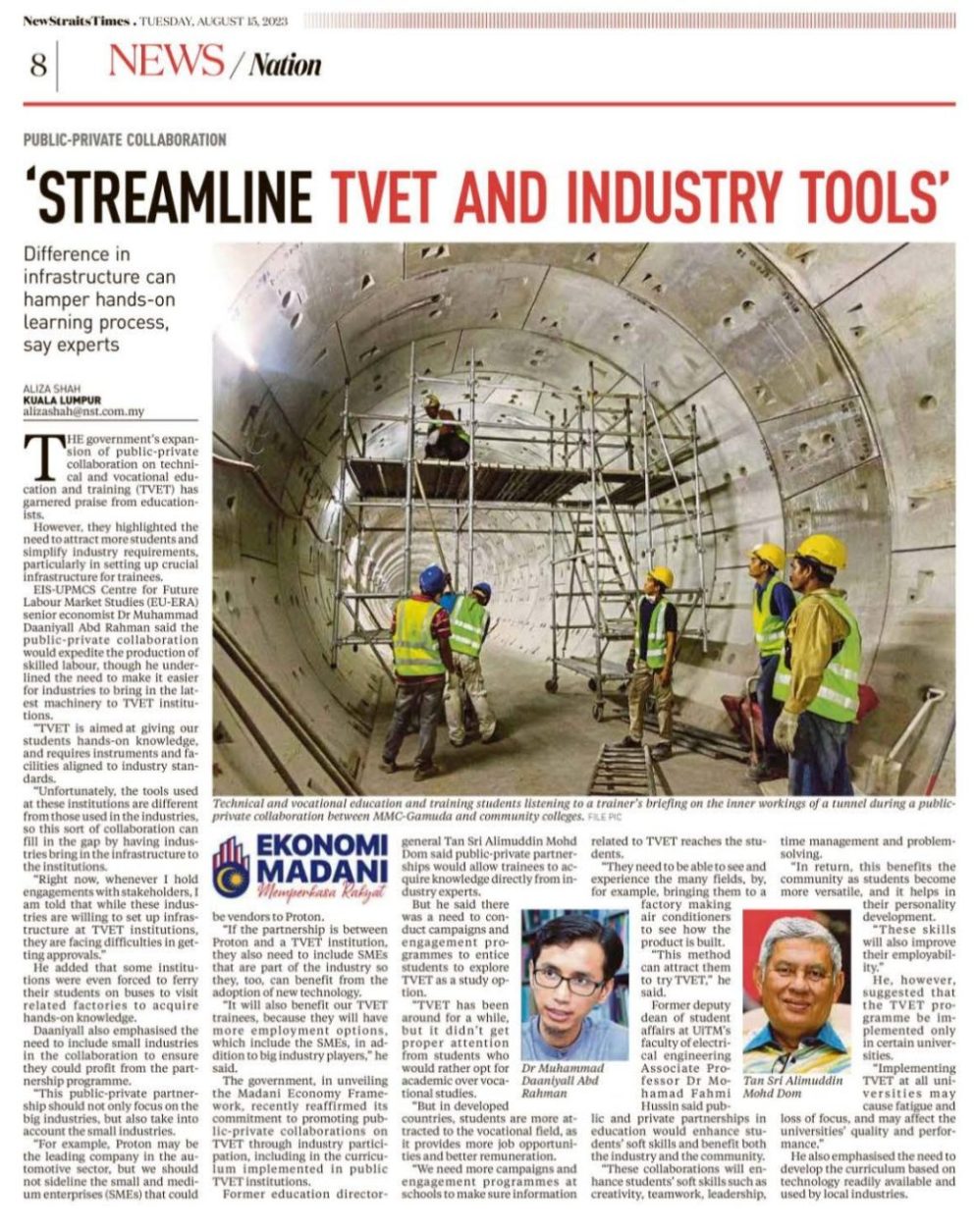
Technical and vocational education and training students listening to a trainer’s briefing on the inner workings of a tunnel during a public-private collaboration between MMC-Gamuda and community colleges. FILE PIC
KUALA LUMPUR: The government’s expansion of public-private collaboration on technical and vocational education and training (TVET) has garnered praise from educationists.
However, they highlighted the need to attract more students and simplify industry requirements, particularly in setting up crucial infrastructure for trainees.
EIS-UPMCS Centre for Future Labour Market Studies (EU-ERA) senior economist Dr Muhammad Daaniyall Abd Rahman said the public-private collaboration would expedite the production of skilled labour, though he underlined the need to make it easier for industries to bring in the latest machinery to TVET institutions.
“TVET is aimed at giving our students hands-on knowledge, and requires instruments and facilities aligned to industry standards.
“Unfortunately, the tools used at these institutions are different from those used in the industries, so this sort of collaboration can fill in the gap by having industries bring in the infrastructure to the institutions.
“Right now, whenever I hold engagements with stakeholders, I am told that while these industries are willing to set up infrastructure at TVET institutions, they are facing difficulties in getting approvals.”
He added that some institutions were even forced to ferry their students on buses to visit related factories to acquire hands-on knowledge.
Daaniyall also emphasised the need to include small industries in the collaboration to ensure they could profit from the partnership programme.
“This public-private partnership should not only focus on the big industries, but also take into account the small industries.
“For example, Proton may be the leading company in the automotive sector, but we should not sideline the small and medium enterprises (SMEs) that could be vendors to Proton.
“If the partnership is between Proton and a TVET institution, they also need to include SMEs that are part of the industry so they, too, can benefit from the adoption of new technology.
“It will also benefit our TVET trainees, because they will have more employment options, which include the SMEs, in addition to big industry players,” he said.
The government, in unveiling the Madani Economy Framework, recently reaffirmed its commitment to promoting public-private collaborations on TVET through industry participation, including in the curriculum implemented in public TVET institutions.
Former education director-general Tan Sri Alimuddin Mohd Dom said public-private partnerships would allow trainees to acquire knowledge directly from industry experts.
But he said there was a need to conduct campaigns and engagement programmes to entice students to explore TVET as a study option.
“TVET has been around for a while, but it didn’t get proper attention from students who would rather opt for academic over vocational studies.
“But in developed countries, students are more attracted to the vocational field, as it provides more job opportunities and better remuneration.
“We need more campaigns and engagement programmes at schools to make sure information related to TVET reaches the students.
“They need to be able to see and experience the many fields, by, for example, bringing them to a factory making air conditioners to see how the product is built.
“This method can attract them to try TVET,” he said.
Former deputy dean of student affairs at UiTM’s faculty of electrical engineering Associate Professor Dr Mohamad Fahmi Hussin said public and private partnerships in education would enhance students’ soft skills and benefit both the industry and the community.
“These collaborations will enhance students’ soft skills such as creativity, teamwork, leadership, time management and problem-solving.
“In return, this benefits the community as students become more versatile, and it helps in their personality development.
“These skills will also improve their employability.”
He, however, suggested that the TVET programme be implemented only in certain universities.
“Implementing TVET at all universities may cause fatigue and loss of focus, and may affect the universities’ quality and performance.”
He also emphasised the need to develop the curriculum based on technology readily available and used by local industries.





